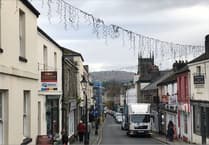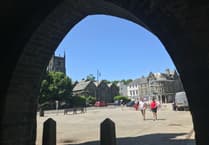The pride of Tavistock’s public street blooms are being eaten alive by hungry passers-by who are being encouraged to do so.
Unusually, this year’s sustainable decorative street planters, which are the town’s entry into the much sought after South West in Bloom competition prizes, are planted with salad lettuces.
Green-fingered members of Tavistock Community Gardening, the voluntary group which designed this year’s entry, is actively urging shoppers, visitors and residents to harvest the ‘cut-and-come-again lettuces’ so they can refresh the late summer displays.
Ali Sedgwick, Tavistock Community Gardening chairperson, said: ‘It might seem a bit strange that we’ve spent so much time and energy putting these planters together and now we’re effectively asking them to be eaten.
‘But we do need people to take their fill of the two types of lettuce before they turn to seed.
‘Then we can fill in the gaps with new plants so the displays can reinvigorate and continue to look good during the summer and beyond.’
The Tavistock in Bloom team, also consisting of Tavistock Business Improvement District and Tavistock Town Council, is going for gold for the second year running, after visits by the Royal Horticultural Society judges in the last two weeks.
The town is defending last year’s double gold medal haul - one for the business improvement district section and one for the Sargent Cup, for towns of a similar size across the South West region.
The lettuces include the red OutRedgeous version, which was the first plant to be grown from seed, harvested and eaten in space. Ali said: ‘Therefore, if anyone fancies an astronaut salad, they are more than welcome to come to Tavistock town centre and help themselves.’
She added: ’Not surprisingly, it looks as though people can’t resist the enticing lettuces and have already been helping themselves. But that’s ok because we hate waste and the South West in Bloom judges have already been and it’s now time to move on.’
Ali said the planters have the theme ‘Living Bird Tables’, designed to be ecologically friendly with plants producing bird seed, edible plants and pollinators. These plants include sunflowers, flax, poppies and copper aranthus.
The edible plants also reflect the issue of food poverty, illustrating that people can grow edible plants even in small spaces, so it was only natural the displays should eventually be eaten, she said.
The South West in Bloom competition judging, which encompasses other related activities, will make its findings public in October.





Comments
This article has no comments yet. Be the first to leave a comment.